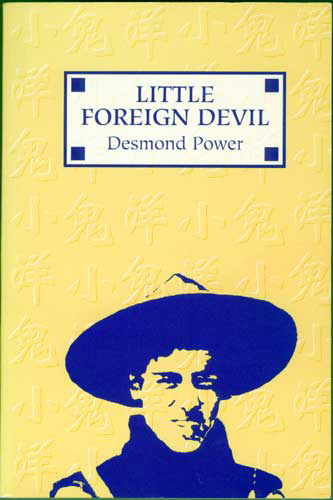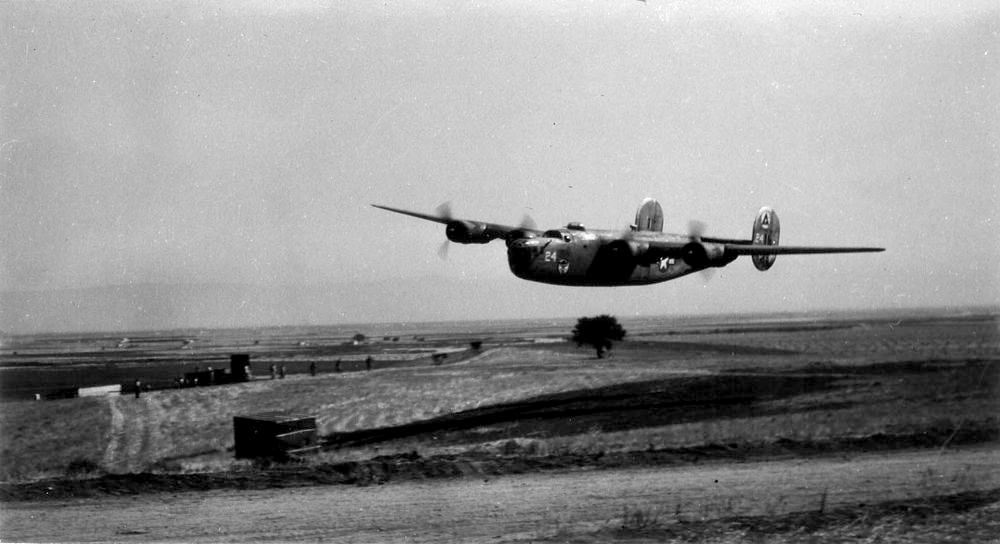
- by Desmond Power
[Excerpts]
...
 What do you think is happening, sir? What should we believe?” I asked Doctor Robinson who was treating me for boils.
What do you think is happening, sir? What should we believe?” I asked Doctor Robinson who was treating me for boils.
“Take it from me, laddie, the war is over. The Commandant will have to come out with it any moment now.”
The USAAF beat the Commandant to it.
On August 17th 1945, at exactly nine o’clock in the morning, an almighty blast just about shook our dormitory building off its foundations. We gazed goggle-eyed at one another:
“What the heck was that?” . . . “Train crash?” . . . “Earthquake?” ... “Bomb?”
“Shut up,” Brian Clarke snapped. “Listen.”
Cupping my ears as he was doing, I picked up the drone of airplane engines, now faint, now dying away, now coming on palpably. The others heard the same.
We scrambled outside. We searched the sky. Vincy Murray broke into a high-pitched squeal:
“Look, there, over there.”
“Where?”
“Can’t you see? Over by the hills.”
Then I spotted it, way out on the horizon, the silhouette of a plane, its bulky shape much like one of those transpacific clippers we used to see on prewar Movietone News. Now it was hovering, now it was turning, ever so slowly, until its nose was pointed at the camp.
And Jiminy Crickets, it was coming straight towards us, low, almost at tree-top level, and the nearer it came, the more incredible its size, the more deafening its engines, until with a stunning shock wave, it wooshed overhead.
In that split second of ear-popping concussion I caught sight of a pink hand waving in a gun turret.
Waving hand!
Must tell the others.
Too late. They were charging helter-skelter for the ball field. When I caught up with them everyone was pointing up at the plane sailing gracefully towards us.
About a quarter of a mile away it began ejecting bundle-like objects from its belly, and in a trice the objects blossomed into parachutes.
“Let’s go,” someone yelled out, and that was enough to start a frantic stampede for the gate.
What about the guards?
No guards, they’d evaporated. I charged through the gateway and quickly gained on stragglers wandering aimlessly along the mud road.
No aimless wandering for me. I had a pretty good idea where those chutes came down. They must be there to the right, in that field of mature seven foot-high gaoliang.

I swerved off the road and thrashed my way through the close-growing inch-thick stalks.
Not a sign of life.
I burst out of the gaoliang and into a stand of millet.
Still nothing. I ploughed on.
Then I saw it, there on a path beside a grave mound, a length of green and brown fabric lying in folds. I inched towards it.
“Hands up! Freeze!” I froze.
From behind the mound rose a figure straight out of Flash Gordon - exotic spaceman’s helmet - gaudy one-piece space suit. Even the miniature carbine he had trained at my middle was an instrument of death from some other planet. The only give-away that he might be a mere earthling was the strips of common sticking plaster attaching his spectacles to his nose and temple.
“Don’t shoot,” I choked out, “I’m British. I’m from an internment camp nearby ...”
“Ammurrka has got a gigantic bomb ...” was all I caught of the burst of words he fired at me.
Like an imbecile, I shrugged my shoulders and shook my head.
He repeated in a flat monotone: “Ammurrka has got a gigantic bomb ... super bomb ... dropped two and killed ourselves half-million gooks ...”
And still those words, for me the very first of the new post-war era, refused to sink in.
We were standing gazing warily at each other when two men from the camp came plunging through the waist-high millet.
They threw themselves on the Martian, they hugged him, they slapped his back, they kissed him.
Tears were streaming down one man’s cheeks.
“You saved us, you saved us, we were all about to die.” (What a fib!) “Is the war really over?” the other gasped out between sobs.
“Ammurrka has won the war,” the deadpan paratrooper was back to his monologue.
“Ammurrka has got the biggest goll-darndest bomb in the world . . . super bomb . . . Hiroshima and Nagasaki zapped . . . killed ourselves a half-million Japs ...
MacArthur is sitting on Hirohito’s throne calling the shots ...” It took a second Martian to switch him off.
This one, borne shoulder-high by adulating internees, fired a salvo of unintelligible jargon at us.
And our Martian countered with a salvo of his own. Was this strange lingo the lingo of the Brave New World?
If so, we were going to have a lot of learning to do. But not right now. Right now, our hero reverted to standard John Wayne English.
“Okay buddies, we gonna head for your camp.
Give us a hand with the chute.” Two idolizing inmates jumped instantly into action, gathering and bundling up the tangles of cord and heavy green and brown fabric.
In triumphant procession we passed under the ceremonial arch and into the Courtyard of the Happy Way. The main road was a bedlam of people screeching and bellowing and dancing the madman’s jig. Someone grabbed my arm.
“The war’s over! We’ve won!” Someone else pounded my back.
“The Americans have invented a wonderful new bomb. They dropped ten on Japan. Wiped out five million Jappos!”
“Not five million, eight million,” a jubilant beetroot-faced man cried out.
“Tokyo, Nagasaki, Yokohama, Hiroshima, all turned to ash. Bloody marvelous! Absolutely marvelous!”
Everyone was pushing and shoving towards the Commandant’s courtyard. I squeezed my way in. Mr. McLaren was standing on a table, waving his hands, calling for silence. All he got for his trouble was a chorus of rude epithets. But when a Martian officer got up on the table there was instant silence.
“I am Major Staiger of the OSS. I can confirm to you that the Government of Japan has agreed to Allied surrender terms. What I can’t tell you though is how the Japanese army in the field is going to react.
It’s possible they may refuse to obey Emperor Hirohito’s order to lay down their arms. The Japanese garrison in Weihsien might turn on us. To calm your fears I want you to know that I have sent a message to their commanding officer advising him that we’re here on a humanitarian mission.
After witnessing the horrors of the prison camps in Europe, we were expecting the worst here. It’s a great relief, let me tell you, to find you alive and kicking. Now, I’m sure your first and foremost desire is to get out of this place. I’m afraid that might take some days, maybe a week, to arrange the necessary transportation, but you can rest assured we’ll do our best to speed you out.
In the meantime, I’ve radioed for more supplies, and for more support personnel. I must ask you now to exercise patience. You’ve stuck it out for the best part of three years; you ought to be able to manage a few more days. For your own safety I’m going to insist that you stay strictly within the walls of this camp. I’m going to ask your senior representative to organize a security team to police the exits. Also, the Japanese guards will retain their arms; I’ve given orders that they continue guarding this place as before....”
Someone in the crowd let out a boo. It didn’t faze the major. He just went right on:
“I’m afraid we’ve no alternative. There’s a lot of fighting going on in the countryside around us. The Chinese are locked in a bitter civil war. No one is to leave this place. That’s an order, and it’s for your own good.
Now, if you don’t mind, we’ve had nothing to eat since dawn. We’d like to share lunch with you.”
Mr. McLaren raised his hand to squelch the shouts of laughter. Then, smothering his own smile, he said to the major:
“You’re welcome to come along to Number Two Kitchen, though you might not find it quite up to the Ritz.”
Accepting the invitation was the biggest mistake of the major’s heroic mission. He and his men came down with an unrelenting dose of the trots.
Just as the OSS hero had promised, more Americans arrived next day, but not by parachute; they came in a C47 transport that landed at the Japanese fighter airstrip at Erhshihlipu five miles to the south.
In bustled a rotund army major, his “re-orientation” team at his heels. “First thing we gonna do,” he announced, “is re-orientate you folks. Can see you need it real bad, so gonna do it real good. Everyone to the church hall, sharp at three, to learn about the new United Nations, its charter, its establishment in San Francisco last April.”
[further reading] ...
http://www.weihsien-paintings.org/books/ForeignDevil/Power-143-pages.pdf#








